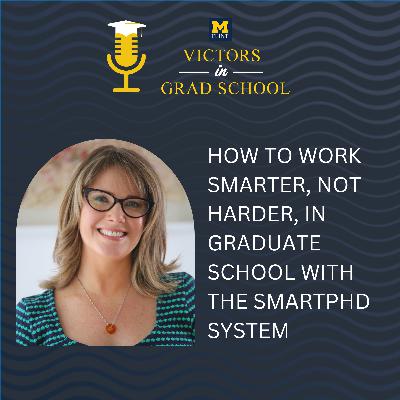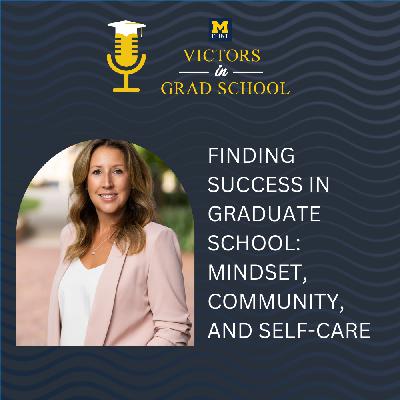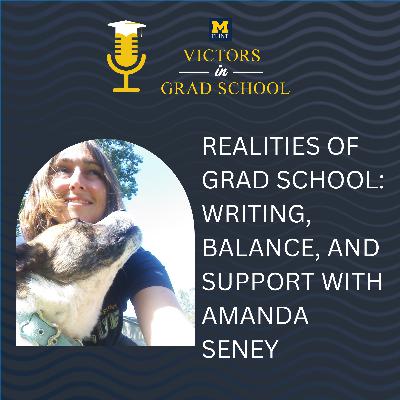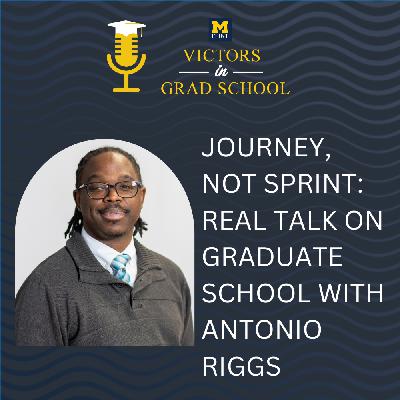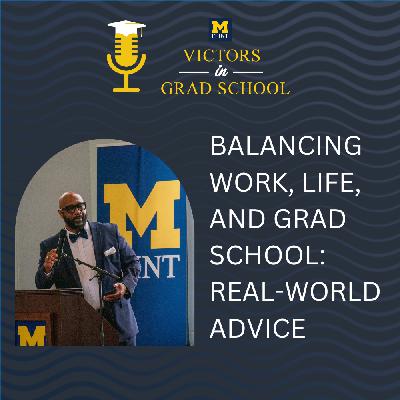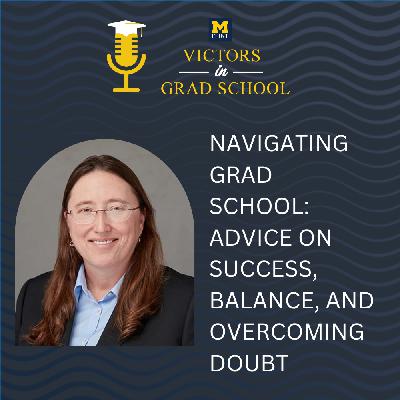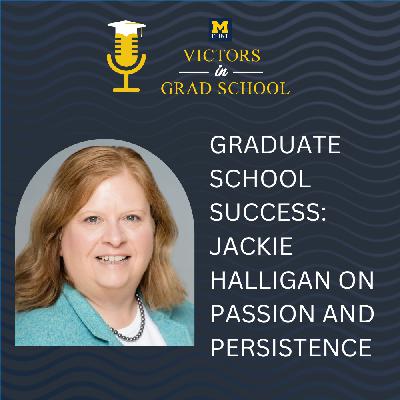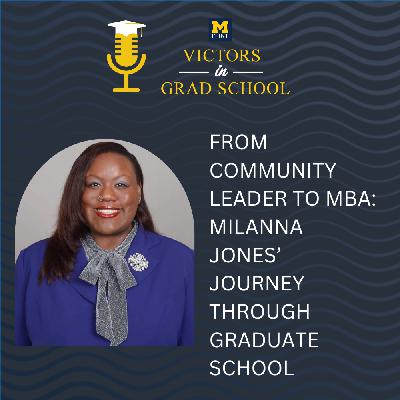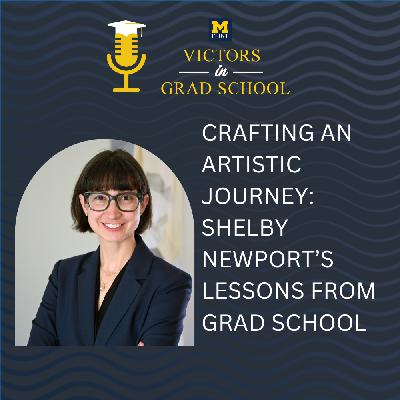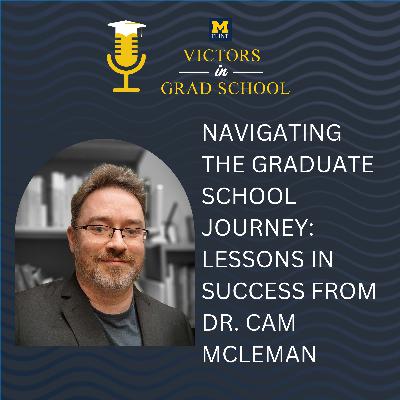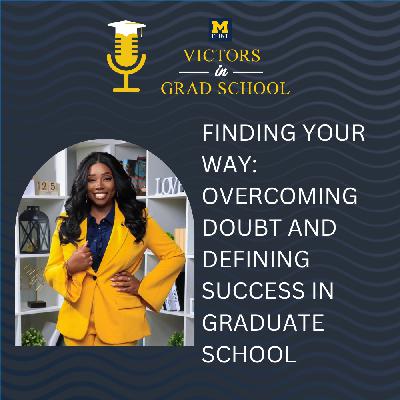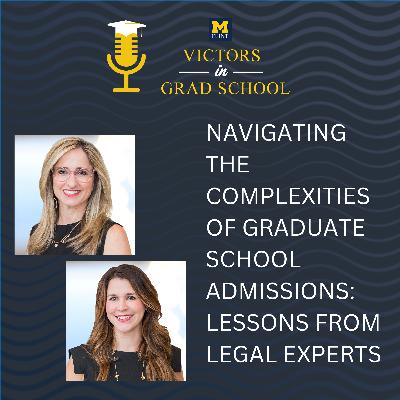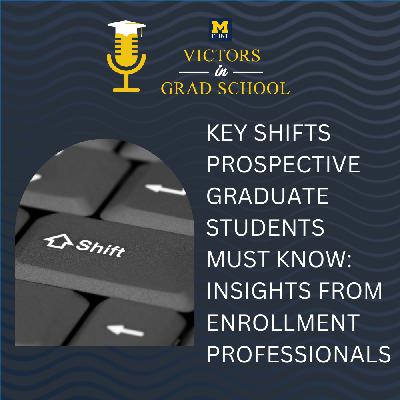How to Work Smarter, Not Harder, in Graduate School With the SmartPhD System
Description
Graduate school is often described as a journey—one filled with peaks of accomplishment and valleys of self-doubt. This week’s "Victors in Grad School" episode with Dr. Lucia Juarez is a must-listen for anyone navigating the challenges of advanced study, or even just considering taking the leap into grad school.
Hosted by Dr. Christopher Lewis, the conversation delves deep into the realities of pursuing a graduate degree across different countries and cultures, and the unique obstacles that arise, especially when juggling family, working in a second language, and adjusting to new academic systems. Dr. Juarez shares her own candid story, from earning scholarships and moving continents to facing the all-too-common “imposter syndrome” and the myth that working harder is always the answer.
One of the most powerful takeaways from Dr. Juarez is that success in graduate school is not solely about relentless effort. Instead, it’s about working smarter—not harder—by building holistic routines that protect your wellbeing, energy, and focus. Dr. Juarez’s personal wake-up call came when her all-in approach to her PhD left her physically and mentally exhausted. Recognizing the unsustainable pace, she began to reimagine her process, experimenting with practical strategies like the Pomodoro technique for focused productivity, intentional breaks, and prioritizing self-care.
These experiences led her to develop the SmartPhD System, a framework that supports students on key dimensions: self-care, mindset, attainable goals, reflection, time management, planning, and positive habits. Whether you’re struggling with motivation, managing multiple responsibilities, or hitting a productivity wall, Dr. Juarez’s system offers a toolkit for making consistent, meaningful progress.
The episode also touches on an often-overlooked aspect of the PhD journey—reconnecting with your original passion. Keeping sight of your purpose can help reignite motivation during tough times. Dr. Juarez encourages listeners to regularly reflect on their “why” and embrace the fullness of their journey, setbacks and all.
If you’re on the verge of giving up or simply searching for ways to be more effective and balanced, this conversation is for you. Dr. Juarez’s insights and empathy remind us that you’re not alone and that small shifts can lead to significant change—not just in grad school, but throughout your career.
Tune in to this episode for practical advice, reassurance, and the inspiration to build your own sustainable system for success in graduate school and beyond!
TRANSCRIPT
Dr. Christopher Lewis [00:00:01 ]:
Welcome to Victors in Grad School, where we have conversations with students, alumni and experts about what it takes to find success in graduate school. Welcome back to Victors in Grad School. I'm your host, Dr. Christopher Lewis, Director of Graduate Programs at the University of Michigan, Flint. Really excited to have you back again this week. As always, every week we are on a journey together. I call it a journey because it is a journey. No matter if you are just starting to think about graduate school, maybe you've applied and gotten accepted, or maybe you're in graduate school.
Dr. Christopher Lewis [00:00:32 ]:
No matter where you are, there are things that you can do at every step of the journey that can help you to be successful in that overall journey. That's why this podcast exists. It is here to help you to be able to identify maybe some stumbling blocks, maybe some things along the way that you can do, to be able to help yourself to prepare yourself well, or find things that you can do, some tools for your toolbox that will help you to be able to have that smooth sailing as you go through graduate school. That's why every week I love being able to bring you different guests with different experiences that can help you to see things a little bit differently and also think about things in a little bit of a different way. Today we've got another great guest. Dr. Lucia Juarez is with us today and Lucia has a very interesting journey and we're going to be talking about her own educational journey, but also a program that she started called SmartPhD that is helping individuals that are going for that PhD to do things smarter and to really think about what they're doing to be able to have that positive, successful experience through the PhD. I'm really excited to have her here.
Dr. Christopher Lewis [00:01:42 ]:
Lucia, thanks so much for being here today.
Dr. Lucia Juarez [00:01:44 ]:
Hi, Chris, thank you so much. I'm so excited to be here because I think one of the things I would love to share with you today is how when I was doing my own PhD, I thought the only way to progress was by working harder and harder. And that really affected me. It almost broke me. So one of the things that I really want to share today is how I managed to find my way around creating a system. As you said, that work helping me and is helping others to finish the dissertation faster without compromising their well being, which is so important. It's becoming more and more important to protect that.
Dr. Christopher Lewis [00:02:20 ]:
Well, before we jump into the SmartPhD program, because I really want to delve into that, I want to learn a little bit about your own journey because I know you did Your undergraduate work in Argentina, because you are from Argentina. That's not where you live now. We'll have some spoilers here in just a little bit of where she lives now, but you started in Argentina, and at some point in that journey, I know that you had an opportunity or you started to think about the next steps. So you were getting that bachelor's degree, and at some point you said, I want to keep going. Bring me back to that point. And what made you decide that going to graduate school was the next step?
Dr. Lucia Juarez [00:02:56 ]:
Thanks, Chris. I think, to be honest, I was always curious about teaching and researching, even before finishing my undergraduate studies. So I started doing, like, advanced courses. I was very interested in heritage conservation, and I got a scholarship as soon as I finished. So I finished in December, in January, applied for a scholarship, and in April, I was traveling to Spain to do my master's degree, and I really, really loved it. And I lived in Spain. I never actually came back home after that. So it's been more than 20 years of that.
Dr. Lucia Juarez [00:03:31 ]:
And years after that, I got a scholarship to do my PhD. Related with heritage conservation as well was more like industrial heritage. I wanted to work something related with Scottish architecture and the connection with Argentina. So Scott, seems like the right place. And I got the scholarship to do it here in Edinburgh University, and I've been here since then. I have two Scottish boys. So staying here? No, I don't know for how long, but I stay here for now.
Dr. Christopher Lewis [00:04:00 ]:
So talk to me a little bit about that transition, because every person goes through transitions, and now you went through some big transitions, going from one country to another country to a further country, going from different language models to different ways of teaching. What did you have to do as you were transitioning from your undergrad to your master's, from your master's to working, from working back into your PhD. What did you have to do to set yourself up for success? And what did you have to do to remain successful through that entire educational journey?
Dr. Lucia Juarez [00:04:34 ]:
I think it's successful. Sometimes it feels like a big word, Chris. I know because I've been listening some of your previous podcasts as well. There are many people in the academic world that suffer from imposter syndrome. Or we have this thing about not feeling good enough, academic enough. For me, my English was never enough. Actually, I was doubting. I am good enough in my English to be in podcast like this one, you know, because you feel like maybe because of my accent, will people really understand when I'm talking? Like, we have so many doubts.
Dr. Lucia Juarez [00:05:06 ]:
And I was listening to some of your previous guests, I think it was Dr. Julie Snyder. She was saying something about transitions as you were saying. And she was saying like it wasn't a smart decision to stay in the campus. She was from the master to the PhD to make things easier. I think we want to look at things to make things easier for us. That's the smart way to do. But not always you have the option if you have a scholarship, you take it or you don't take it.
Dr. Lucia Juarez [00:05:37 ]:
And, and for me, as you said before in another country, in another language, another way of doing without family support, without friends, I was like, at least I came here with my husband and that was nice company to have. And you don't feel that you need to start everything from scratch. But it was a big challenge. So when you were saying about being successful, I think sometimes it's not so linear. So there is a lot of ups and downs. And I think what we tried to do is these downs not to be going so deep. What happened to me, I think I was so deep that I needed to make a change. So when I was there at the beginning, I thought that working harder was the only option.
Dr. Lucia Juarez [00:06:25 ]:<b

